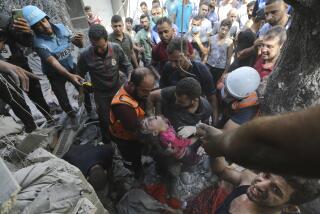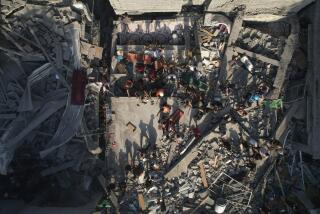Blast Kills Scores at Iraq Mosque
- Share via
NAJAF, Iraq — As thousands of Muslims emerged from Friday prayers, a powerful car bomb rocked the holiest Shiite shrine in Iraq, claiming the lives of more than 90 people and one of this nation’s most influential clerics.
The death of Ayatollah Mohammed Bakr Hakim, 64, a voice of moderation in volatile postwar Iraq, quickly ignited tensions here and throughout the country. The most serious setback yet to Bush administration efforts in Iraq, it threatened to torpedo the U.S.-led mission to stabilize the country and trigger new waves of hard-to-quell violence. Hakim’s associates blamed the bombing, Iraq’s deadliest episode of religious violence in recent memory, on die-hard remnants of Saddam Hussein’s regime. Some Iraqis suspected rival, radical Shiite clerics who had clashed with Hakim; they in turn sought to cast blame on the “enemies of Islam,” singling out the United States and Israel.
It was the third major bombing in Iraq in slightly more than three weeks, compounding a widely held notion among Iraqis that the U.S.-led force of more than 150,000 is failing to protect them. The earlier attacks targeted the Jordanian Embassy and the United Nations headquarters in Baghdad, which together claimed nearly 40 lives.
The slain ayatollah, who headed the largest political organization of Iraqi Shiites, the Supreme Council for Islamic Revolution in Iraq, returned triumphantly to his country just three months ago after more than two decades of exile in Iran.
Despite his pro-Iranian leanings, he came reluctantly to favor cooperation with the U.S.-led occupation. That position put him at odds with significant segments of the Iraqi population and other less tolerant Shiite leadership.
On Friday, Hakim led prayers here at the gold-domed Imam Ali Mosque, where Shiites believe the man they consider the prophet Muhammad’s rightful successor is buried. Again, the cleric made a plea for unity among Iraqis and patience with the U.S.-led occupiers.
He then left the mosque and walked to his car, which was in the street, witnesses said. There were conflicting reports after the pandemonium that ensued, but it appears that Hakim’s car suddenly exploded in a fiery roar.
The force of the blast crushed a two-story mall across the street, dug a 3-foot-deep crater in the ground and hurled bodies and body parts for blocks. Bloody victims staggered in a daze or screamed in pain and panic. A dozen or more cars were in flames. The air reeked of burned rubber, and streets were coated in oil, twisted metal, glass and debris.
The mosque itself was damaged. The multicolored tiles on one of the building’s intricate, arched porticos were shattered. It was the door routinely used by Hakim.
“It was like a great wind of dust and debris, and a tremendous explosion,” Ibrahim Abood, a 33-year-old laborer who had just left prayers at the time of the blast, said from a hospital bed, his head swathed in bandages.
“All of a sudden it was like a storm had come, and people were running, trying to leave the scene,” said Anwar Hashen, 24, who works at a nearby hotel that caters to religious pilgrims. Shards of metal from burning cars peppered the hotel. “It was a terrible, terrible thing,” he said of the scene in the wake of the blast.
Police said Hakim was the target, although it wasn’t immediately clear whether he was felled by a suicide bomber or a remote-controlled device. Witnesses said one of the mangled cars belonged to his bodyguards.
“It seems whoever did this waited for him, even counting his steps,” Police Capt. Adan Mousa said.
No American forces were near the mosque at the time, out of the U.S. military’s concern over treading too near a site considered sacred by Iraqis.
In Crawford, Texas, President Bush condemned the bombing that killed Hakim.
“His murder today, along with the murder of many innocent men and women gathered for prayer, demonstrates the cruelty and desperation of the enemies of the Iraqi people,” Bush said in a statement. “I have instructed American officials in Iraq to work closely with Iraqi security officials and the Governing Council to determine who committed this terrible attack and bring them to justice.”
The death toll seemed likely to exceed 100, as more victims die of their wounds and the casualty figures are tallied at the various hospitals where victims were taken in a makeshift parade of emergency vehicles and private cars.
At Najaf Teaching Hospital, the city’s largest, physicians confirmed that 90 people had died and 130 were injured, about 30 of them seriously. Deaths were reported by at least one other hospital. The toll made it one of the most devastating terrorist bombings in recent years in the Middle East.
“It was a very terrible thing,” said Dr. Ali Najin, 31. “Many of the victims were terribly burned or mutilated.”
Najin and other physicians described an unforgiving day in which they tried to cope with the influx of patients. Patients waited for treatment in hospital corridors while loudspeakers at mosques called on residents to donate blood.
As news of Hakim’s death spread, tens of thousands of his enraged supporters swarmed the site of the blast. They arrived by the busloads, tromped over the charred metal wreckage of the bombed car and waved their arms in grief.
Relatives from all over Iraq rushed to Najaf in search of family members who had traveled to the holy city for prayers.
Anticipated retaliation for Hakim’s slaying raises the specter of ever deadlier chaos swamping Iraq, pitting Shiite Muslim against Sunni Muslim, Shiite against Shiite, Iraqi against American. Though it was unknown Friday who was responsible for the blast, speculation was rampant.
Among the Shiites, rival factions have been locked in an increasingly violent struggle for power. Hakim and other more conservative, elderly clerics favor waiting out the occupation peacefully, confident that Shiites, who make up 60% of Iraq’s population, will rule the nation soon enough.
Hakim endorsed the naming of his brother, Abdelaziz Hakim, to the U.S.-appointed 25-member Governing Council, a body meant as a transitional quasi-government. The council is seen by Hakim’s more radical rivals as a puppet of the Americans.
Those rivals include a younger generation of firebrand sheiks and imams who long to create an Iranian-style theocracy and who denounce what they call America’s “war against Islam,” and threaten to drive U.S. troops from the country by force. They appeal to many of Iraq’s disenfranchised poor.
Among that faction is Muqtader Sadr, a sheik believed to be in his mid-20s who is the son of a revered ayatollah killed by Hussein’s forces in 1999. Some Iraqis accused him of being behind an assassination attempt on Hakim’s uncle last week in Najaf.
Several religious leaders said, however, that no Shiite would attack Imam Ali Mosque, even in the most bitter internecine fight. It sits atop what is believed to be the tomb of Ali, the prophet Muhammad’s son-in-law, whom Shiites consider Muhammad’s rightful successor. It is what makes Najaf a holy city and a center of Shiite power and learning in Iraq.
The Shiite following of Ali centuries ago led to the faction’s split with Sunni Muslims. Hussein and Iraq’s minority Sunnis ruled Iraq and oppressed the majority Shiites until the U.S.-led forces deposed him in April.
On Friday night, Sadr issued a strong statement blaming the bombing on “the enemies of Islam and of Muslims” and on the “cursed trilogy of the U.S., Britain and Israel” who stood to benefit from the anarchy that is sure to grip Shiites in the coming days.
“This is a blunt aggression,” he said in a statement. “America is our enemy.”
He later seemed to backtrack, issuing a statement that urged restraint.
Other Shiite leaders put most of the blame on loyalists of the Hussein regime, which tortured and killed members of Hakim’s family.
“These shameful acts reflect the magnitude of the crimes committed by the remnants of Saddam Hussein and his aides,” said Mohammed Bakr Nasir, secretary-general of the Moujahedeen Scholars Movement. However, he went on to say that U.S. forces bear some of the blame for failing to capture criminals and terrorists.
And, as with the Aug. 19 bombing of the U.N. headquarters in Baghdad, where at least 22 people were killed, including the head of the mission, some blamed foreign and Islamic terrorists.
U.S. officials have previously denounced the presence of Ansar al Islam and the Al Qaeda terrorist network in Iraq. But specialists in Washington questioned whether those groups would risk angering Iran, which is believed to have provided sanctuary to their members in addition to sheltering Hakim.
In Washington, officials from the CIA and other intelligence agencies said they had not reached any conclusions about the perpetrators of Friday’s attack, but they noted the long list of candidates and the likelihood of more bloodshed.
Security and Middle East experts said the question of who was responsible could fuel already violent tensions among ethnic groups, religious factions and forces for and against the U.S. presence.
“This can spin really out of control really quickly,” said Jon B. Alterman, director of the Middle East program at the Center for Strategic and International Studies in Washington. “You could be moving toward a scenario where Iraq is the site of a large number of proxy wars.”
Late Friday in Najaf, a demonstration erupted near the mosque. The protesters generally blamed Islamic extremists and Hussein loyalists for the bombing.
But they also chastised U.S. authorities for failing to protect Hakim and safeguard Najaf and other parts of Iraq.
“The Americans said our life would be a paradise, but in these months they have done nothing to make our lives better, to improve security, provide electricity,” said Mushtaq Mohammed, a butcher wounded in the attack. “We are tired of this treatment. We are just waiting for word from our clerics to act.”
*
McDonnell reported from Najaf and Wilkinson from Baghdad. Times staff writers Greg Miller in Washington, Carol J. Williams in Baghdad and Edwin Chen in Crawford contributed to this report.
--- UNPUBLISHED NOTE ---
In stories after April 9, 2004, Shiite cleric Muqtader Sadr is correctly referred to as Muqtada Sadr.
--- END NOTE ---
More to Read
Sign up for Essential California
The most important California stories and recommendations in your inbox every morning.
You may occasionally receive promotional content from the Los Angeles Times.














